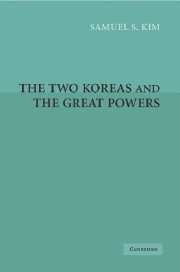Book contents
- Frontmatter
- Contents
- List of Tables and Figures
- Preface
- Chapter 1 Introduction: Korea and the Great Powers in a Changing World
- Chapter 2 China and the Two Koreas
- Chapter 3 Russia and the Two Koreas
- Chapter 4 Japan and the Two Koreas
- Chapter 5 The United States and the Two Koreas
- Chapter 6 The Future of the Two Koreas
- References
- Index
- Frontmatter
- Contents
- List of Tables and Figures
- Preface
- Chapter 1 Introduction: Korea and the Great Powers in a Changing World
- Chapter 2 China and the Two Koreas
- Chapter 3 Russia and the Two Koreas
- Chapter 4 Japan and the Two Koreas
- Chapter 5 The United States and the Two Koreas
- Chapter 6 The Future of the Two Koreas
- References
- Index
Summary
The Korean peninsula, although situated at the crossroads of Northeast Asia, has often been home to political entities that sought isolation from the world outside. In the twentieth century, however, Korea's attempts to maintain itself as the “hermit kingdom” were overthrown in succession by Japanese colonization, the World War II settlement, the beginning of the Cold War, the end of the Cold War, and the intensification of globalization. Because of the course of international history following World War II, on the Korean peninsula today there are two Korean states, whereas for the 1,269 previous years there had been only one. North and South Korea as we know them today do not exist as entities entirely of their own making but rather as two incomplete nation-states with national identities crafted in the cauldron of Cold War conflict and galvanized in the post–Cold War age of globalization.
With a synthetic interactive approach to studying foreign relations as its starting point, this book explores how the identities of North and South Korea have evolved in relation to the Big Four of Northeast Asia: China, Japan, Russia, and the United States. Just as for individuals there can be no definition of the self without reference to some other, so with nation-states there can be no development of national identity without reference to the set of other actors in world politics.
- Type
- Chapter
- Information
- The Two Koreas and the Great Powers , pp. xiii - xviPublisher: Cambridge University PressPrint publication year: 2006



